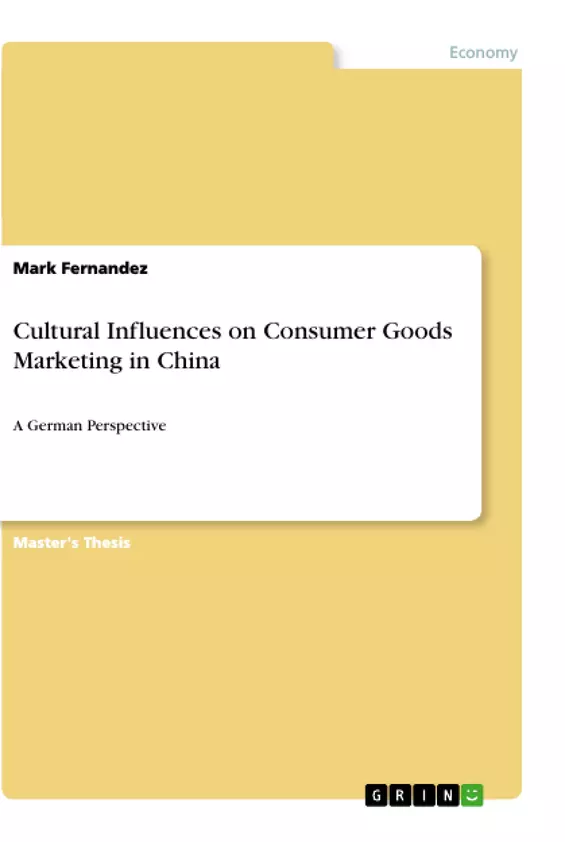In recent years, China has witnessed the most skyrocketing economic growth in history. For Germany, China has become the third most important trading partner. Especially for German key industries like the automotive branch and mechanical engineering, the Chinese market has become vitally important. The shift from a seller’s market to a buyer’s market in China with an excess of supply over demand is accompanied by extreme competition between countless suppliers, which forces competing companies to implement efficient and effective marketing strategies in order to acquire customers. Cultural factors in China and Germany differ so much that they affect the entire success of business. They act as invisible barriers that must be overcome, not only in order to build competitive advantages, but in order to be competitive at all. When entering the Chinese market, foreign firms must consider that they will operate in a completely different culture, in which perception, communication, norms, values and other aspects cannot be compared to their respective German counterparts. As this thesis will show, many foreign firms fail in the Chinese market due to their inadequate altercation with cultural specifics, an unwillingness to adapt their strategy to the cultural environment, or a product-market mismatch based on cultural dissimilarities.
In order to implement marketing strategies flexibly and effectively in a completely different environment for a completely different target clientele, it is indispensable for German marketers to learn about Chinese culture mindfully.
Therefore, the main objective of this work is to prepare German marketing professionals for conducting marketing activities in the Chinese market by demonstrating the impact of culture on marketing, making German marketers more familiar with Chinese culture, and by providing useful advice for their marketing strategies.
Inhaltsverzeichnis (Table of Contents)
- Introduction
- General Conditions in the Chinese Business Environment: An Introduction to the Chinese Market
- China's Economic Development from 1949-1978
- China's Economic Reform
- China's Market Today
- Population
- Principles of Marketing
- Bilateral Economic Relations with Germany
- Threats and Opportunities
- The Importance of Culture for Marketing
- Definition of Culture
- Connection between Culture and Marketing
- Cross-cultural Implications for Marketing Management
- Chinese Culture
- Hofstede's Cultural Dimensions
- Appraisement of Hofstede's Cultural Dimensions
- Power Distance
- Individualism vs. Collectivism
- Masculinity vs. Femininity
- Uncertainty Avoidance
- Long-Term Orientation vs. Short-Term Orientation
- Mianzi: The Concept of Face
- Mandarin: The Chinese Language, Calligraphy, and Communication Behavior
- Hall's High-Context and Low-Context Cultures
- Confucianism: The Pursuit of Harmony
- Guanxi: Interpersonal Networks
- Political and Legal Environment
- Culture in Transition
- Hofstede's Cultural Dimensions
- Strategic Marketing Implications
- International Marketing vs. Global Marketing
- Standardization vs. Adaptation
- The Search of the Optimal Adaptation Degree
- Market Segmentation
- Operational Marketing Implications: Adjusting the Marketing Mix
- Product Decisions
- Consumption Patterns and Product Features
- Buying Decisions
- Differentiation Strategies
- Pricing Decisions
- Price-Influencing Trade Barriers
- Purchasing Power
- Price Sensitivity
- The Luxury Goods Market: A Particularly Challenging Market
- Pricing Strategy
- Financing Services
- Promotion Decisions
- Legal Conditions, Cultural Norms
- Appropriateness and Suitability of Advertising Styles
- Advertising Channels
- Distribution Decisions
- Traffic Infrastructure
- Distribution Channels
- Product Decisions
Zielsetzung und Themenschwerpunkte (Objectives and Key Themes)
This master's thesis examines the influence of cultural factors on consumer goods marketing in China from a German perspective. The primary objective is to provide insights into the key cultural considerations that German companies must address when marketing their products in the Chinese market. Key themes explored in the thesis include:- The historical and economic context of the Chinese market
- The role of culture in marketing
- The specific cultural nuances of Chinese society, including Hofstede's cultural dimensions, the concept of "mianzi" (face), and the importance of Guanxi (interpersonal networks)
- The implications of these cultural factors for marketing strategies and the marketing mix
- The application of these insights to practical marketing decisions regarding product, pricing, promotion, and distribution.
Zusammenfassung der Kapitel (Chapter Summaries)
- Introduction: This chapter provides an overview of the research topic, its relevance, and the research methodology employed. It also outlines the structure of the thesis.
- General Conditions in the Chinese Business Environment: This chapter provides background information on the Chinese market, including its economic development, reform process, and current market characteristics. It also examines the principles of marketing and its various types.
- The Importance of Culture for Marketing: This chapter defines the concept of culture and explores the interconnectedness of culture and marketing. It also examines the cross-cultural implications for marketing management.
- Chinese Culture: This chapter delves into the unique cultural characteristics of Chinese society, analyzing Hofstede's cultural dimensions, the concept of "mianzi," the role of the Chinese language and communication styles, and the impact of Confucianism and Guanxi. It also examines the political and legal environment and the dynamics of cultural transition in China.
- Strategic Marketing Implications: This chapter examines the strategic implications of cultural differences for marketing in China, comparing international and global marketing approaches. It explores the concepts of standardization and adaptation, the search for optimal adaptation levels, and the importance of market segmentation.
- Operational Marketing Implications: Adjusting the Marketing Mix: This chapter focuses on the practical implications of cultural factors for specific marketing mix elements, such as product decisions, pricing strategies, promotion strategies, and distribution decisions.
Schlüsselwörter (Keywords)
The core focus of this master's thesis revolves around cultural influences on consumer goods marketing in China, particularly from a German perspective. Key terms and concepts include: Chinese market, cultural dimensions, Hofstede, "mianzi," Guanxi, marketing strategies, marketing mix, product adaptation, pricing, promotion, distribution, international marketing, global marketing, and standardization vs. adaptation.- Citar trabajo
- Mark Fernandez (Autor), 2015, Cultural Influences on Consumer Goods Marketing in China, Múnich, GRIN Verlag, https://www.grin.com/document/512770



